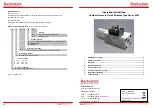
36-2
Catalyst 2975 Switch Software Configuration Guide
OL-19720-02
Chapter 36 Configuring IPv6 MLD Snooping
Understanding MLD Snooping
equivalent to IGMPv2 and MLD version 2 (MLDv2) is equivalent to IGMPv3. MLD is a subprotocol of
Internet Control Message Protocol version 6 (ICMPv6), and MLD messages are a subset of ICMPv6
messages, identified in IPv6 packets by a preceding Next Header value of 58.
The switch supports two versions of MLD snooping:
•
MLDv1 snooping detects MLDv1 control packets and sets up traffic bridging based on IPv6
destination multicast addresses.
•
MLDv2 basic snooping (MBSS) uses MLDv2 control packets to set up traffic forwarding based on
IPv6 destination multicast addresses.
The switch can snoop on both MLDv1 and MLDv2 protocol packets and bridge IPv6 multicast data
based on destination IPv6 multicast addresses.
Note
The switch does not support MLDv2 enhanced snooping (MESS), which sets up IPv6 source and
destination multicast address-based forwarding.
MLD snooping can be enabled or disabled globally or per VLAN. When MLD snooping is enabled, a
per-VLAN IPv6 multicast MAC address table is constructed in software and a per-VLAN IPv6 multicast
address table is constructed in software and hardware. The switch then performs IPv6 multicast-address
based bridging in hardware.
These sections describe some parameters of IPv6 MLD snooping:
•
•
•
Multicast Client Aging Robustness, page 36-3
•
Multicast Router Discovery, page 36-3
•
•
MLD Done Messages and Immediate-Leave, page 36-4
•
Topology Change Notification Processing, page 36-5
•
MLD Snooping in Switch Stacks, page 36-5
MLD Messages
MLDv1 supports three types of messages:
•
Listener Queries are the equivalent of IGMPv2 queries and are either General Queries or
Multicast-Address-Specific Queries (MASQs).
•
Multicast Listener Reports are the equivalent of IGMPv2 reports.
•
Multicast Listener Done messages are the equivalent of IGMPv2 leave messages.
MLDv2 supports MLDv2 queries and reports, as well as MLDv1 Report and Done messages.
Message timers and state transitions resulting from messages being sent or received are the same as those
of IGMPv2 messages. MLD messages that do not have valid link-local IPv6 source addresses are ignored
by MLD routers and switches.
















































